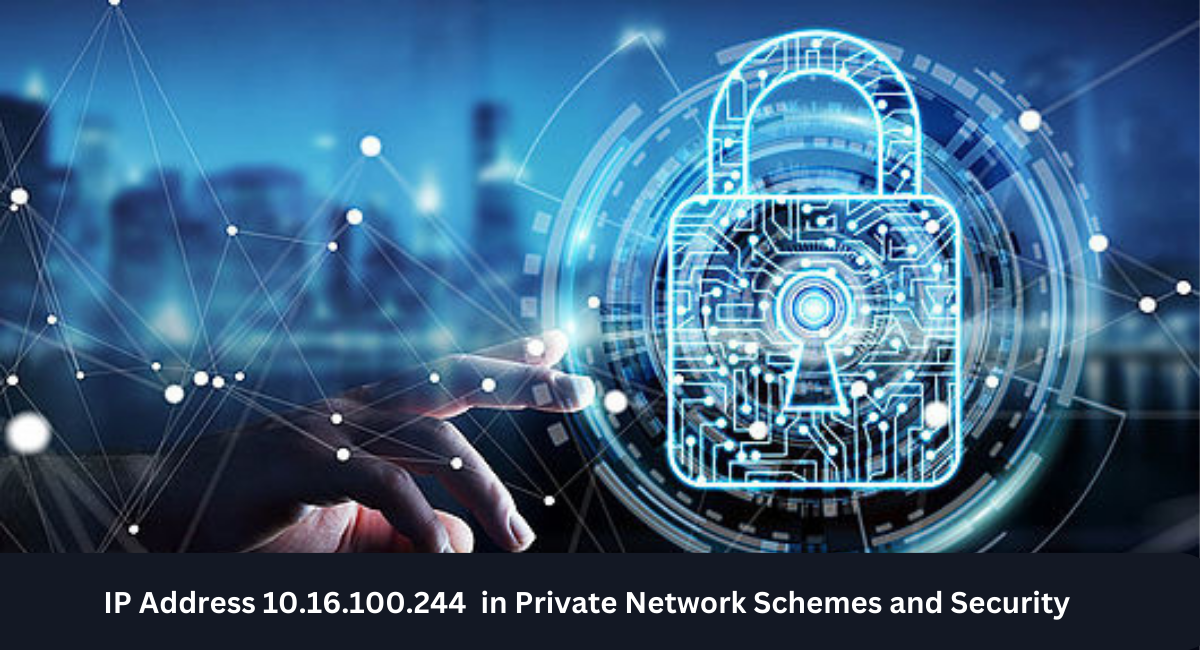In the intricate world of network management and cybersecurity, understanding the role and significance of IP addresses is crucial. Among the myriad of IP addresses used in private networks, 10.16.100.244 serves as a notable example. This article explores the role of IP address 10.16.100.244 in private network schemes, its implications for network security, and best practices for managing such addresses.
Introduction to IP Addressing
An IP (Internet Protocol) address is a numerical label assigned to each device connected to a computer network that uses the Internet Protocol for communication. IP addresses are essential for identifying devices and facilitating the routing of information across networks. They come in two main versions: IPv4 and IPv6.
IPv4 addresses, like 10.16.100.244, consist of four sets of numbers separated by periods, each ranging from 0 to 255. IPv6 addresses are longer and use a hexadecimal format. The IP address 10.16.100.244 falls under the IPv4 format and is part of a private IP address range.

Understanding Private IP Addressing
Private IP addresses are used within private networks and are not routable on the public internet. They are designated for internal use in organizations, homes, and other private settings. The primary ranges for private IPv4 addresses are:
- 10.0.0.0 to 10.255.255.255
- 172.16.0.0 to 172.31.255.255
- 192.168.0.0 to 192.168.255.255
The IP address 10.16.100.244 falls within the 10.0.0.0 to 10.255.255.255 range, which is often used in larger private networks. This address range allows for a large number of addresses, making it suitable for enterprises and organizations with extensive networking needs.
The Role of IP Address 10.16.100.244 in Private Networks
1. Network Segmentation and Addressing
In a private network, IP addresses like 10.16.100.244 play a critical role in network segmentation and addressing. Network segmentation involves dividing a larger network into smaller, more manageable segments or subnets. This approach enhances network performance and security.
2. Subnetting
Subnetting is a method used to create multiple sub-networks within a larger network. IP address 10.16.100.244 could be part of a subnet within the 10.16.0.0 network. Subnetting allows for efficient IP address management and improved network organization.
- Example Configuration: In a corporate environment, the network might be segmented into subnets for different departments. For instance, the IT department might use the subnet 10.16.100.0/24, with IP addresses ranging from 10.16.100.1 to 10.16.100.254. The address 10.16.100.244 could be assigned to a specific device or server within this subnet.
3. Private Network Design
The design of a private network often involves creating multiple subnets to separate different types of traffic and enhance security. IP address 10.16.100.244 might be used for various purposes, such as:
- Workstations: Devices used by employees for daily tasks.
- Servers: Machines hosting applications, databases, or internal services.
- Printers and Network Devices: Shared resources within the organization.
Also Read : 10.0.0.0.1 in Network Configurations | 192.168.0.200 for Router and Device | 127.0.0.1:57573 for Efficient Local Network
Network Security and Management
IP addresses within private networks, including 10.16.100.244, are integral to network security and management practices. Proper management and security measures are essential to protect the network from internal and external threats.
1. Access Control
Access control involves regulating who can access various resources within a network. IP address 10.16.100.244 might be associated with a device that requires restricted access.
- Firewall Rules: Firewalls are used to control traffic based on IP addresses. For instance, a firewall rule might allow or deny traffic to or from IP address 10.16.100.244 based on its role and the security policies of the organization.
- Network Policies: Access policies can be implemented to restrict or grant access to specific devices based on their IP addresses. This helps ensure that sensitive resources are only accessible to authorized personnel.
2. Network Monitoring
Monitoring network traffic and performance is crucial for identifying potential issues and ensuring smooth operation. IP address 10.16.100.244 can be monitored to track its activities and detect any anomalies.
- Traffic Analysis: Network monitoring tools can analyze traffic associated with IP address 10.16.100.244. This helps identify unusual patterns or potential security threats, such as unauthorized access attempts or excessive traffic.
- Log Management: Logs generated by network devices and security systems can provide insights into the activities involving IP address 10.16.100.244. Reviewing these logs helps in diagnosing problems and investigating security incidents.
3. Vulnerability Management
Managing vulnerabilities involves identifying and addressing weaknesses within the network that could be exploited by attackers. IP address 10.16.100.244 might be subject to vulnerability assessments and security updates.
- Patch Management: Ensuring that devices associated with IP address 10.16.100.244 have the latest security patches and updates is crucial for protecting them from known vulnerabilities.
- Vulnerability Scanning: Regular vulnerability scans can identify potential security issues related to IP address 10.16.100.244, enabling timely remediation to reduce the risk of exploitation.
Also Read : IP Address 34.217.198.225 | 10.10.10.2 in Network Security | 111.90.159.132: The Mysterious
Best Practices for Managing Private IP Addresses
Proper management of private IP addresses, including 10.16.100.244, is essential for maintaining a secure and efficient network. Here are some best practices to consider:
1. Proper IP Address Allocation
Efficient allocation of IP addresses helps in organizing the network and preventing conflicts.
- Address Planning: Develop a structured IP address plan that aligns with the network’s segmentation and growth needs. Ensure that IP address 10.16.100.244 is assigned according to this plan.
- Avoid Conflicts: Use DHCP (Dynamic Host Configuration Protocol) for dynamic IP address assignment, and maintain accurate records to prevent conflicts between static and dynamic addresses.
2. Implementing Security Controls
Security controls help protect the network and its devices from unauthorized access and threats.
- Use Firewalls: Implement firewalls to control traffic based on IP addresses and enforce security policies. Configure rules to protect IP address 10.16.100.244 from unauthorized access.
- Encrypt Data: Use encryption to secure data transmitted to and from IP address 10.16.100.244. Encryption helps protect sensitive information from being intercepted and read by unauthorized parties.
3. Regular Monitoring and Auditing
Ongoing monitoring and auditing are essential for maintaining network security and performance.
- Monitor Network Traffic: Continuously monitor traffic associated with IP address 10.16.100.244 to detect any unusual activities or potential threats.
- Conduct Audits: Regularly audit network configurations and access controls related to IP address 10.16.100.244 to ensure compliance with security policies and identify any areas for improvement.
4. Educate and Train Personnel
Training and educating network administrators and users can help prevent security incidents and improve network management.
- Security Awareness: Provide training on network security best practices, including the importance of IP address management and the role of private IP addresses in protecting network resources.
- Technical Skills: Ensure that network administrators have the necessary skills and knowledge to manage and secure private IP addresses effectively.
Conclusion
IP address 10.16.100.244 plays a significant role in private network schemes, offering insights into network segmentation, security, and management. As part of the 10.0.0.0 private IP range, it is used in various contexts within internal networks, including workstations, servers, and network devices.
Understanding the role of IP address 10.16.100.244 involves exploring its use in network segmentation, addressing, and security practices. By implementing best practices for IP address management, organizations can enhance network security, prevent conflicts, and ensure efficient operation.
In a world where network security threats are increasingly sophisticated, maintaining robust IP address management and security protocols is crucial. IP address 10.16.100.244 serves as a reminder of the importance of careful planning, monitoring, and protection in maintaining a secure and effective private network.
